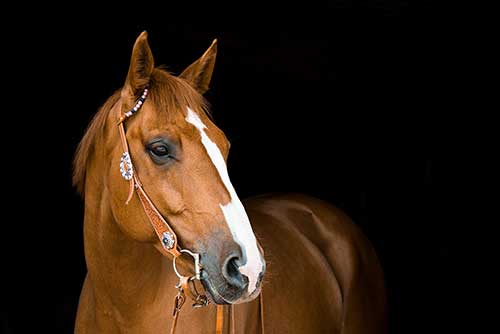
by Jackie Bellamy-Zions, Equine Guelph
“Most horses have been exposed to the equine herpies virus,” says Dr. Diego Gomez-Nieto, researcher at the Ontario Veterinary College. Gomez has been part of a research study on the Equine Herpes Virus which discovered the nasal microbiota of infected horses differed significantly to those of a healthy control group. The study came together quickly and was conducted on a horse farm in Ontario that was experiencing an outbreak.
The Jan 2021 research paper explains nasal bacterial microbiota of healthy horses is richer and more diverse than that previously reported using culture-based methodology. “We found that there is a myriad of different types of bacteria in the nasal cavity of the horse, and they are kept in a normal balance,” says Gomez. “However, when there is a respiratory infection from a virus (like equine herpes virus), the normal balance of the nasal bacterial population is disrupted allowing some pathogenic bacteria to proliferate and cause disease. One of those diseases is pneumonia. The results of our study help to explain why and how pneumonia develops in horses after a viral infection of the respiratory tract.”
In an interview with Equine Guelph, Dr. Gomez discusses the findings of this study and what horse owners need to know to protect their horses from EHV.
When Dr. Gomez opened with the statement: most horses have already been infected with equine herpies virus, your eyes may have widened but this fact need not cause alarm, as for most equines this does not cause any serious problems.
When a horse is showing signs of illness, then it is important to pick up on these signs and take action early on. For EHV this may include: fever, limb edema, and nasal discharge. When a horse is shedding the virus it is highly contagious and quarantine protocols are of paramount importance.
“If horse owners and care takers detect any of those clinical signs, they should consult with their veterinarians and pursue testing,” says Gomez. “Sometimes the only sign will be fever. The result of our study and other studies shows that if a farm is experiencing an outbreak of equine herpes virus, owners should check temperatures for all horses twice a day because if they check only once a day, they can miss some fevers. Owners need to keep a log of these recordings.”
The EHV virus can present as respiratory disease or neurological disease, and in some cases can cause abortion. Early intervention can help ameliorate the disease and speed up recovery time. Rigorous hygiene, and infection control measures can help control the spread. This includes washing hands and changing clothing before handling other horses. Communication is vital to alert other horse owners that the horse has been in contact with.
“We are learning more about the interaction between virus and bacteria,” says Gomez. “Usually, the virus enters the respiratory system, produces inflammation and decreases the mechanisms of defense of the respiratory tract. When those mechanisms are not working anymore, pathogenic bacteria are able to colonize the respiratory tract.”
The study demonstrates how fast the virus spread in the farm, how many animals can get affected at the same time, and that this can have fatal consequences for the horses.
A biosecurity plan is essential to practice infection control. The disease can spread by direct contact from one horse to another or by contaminated nasal secretions. EHV can also spread indirectly through contact with physical objects that are contaminated with the virus. Sharing of equipment between horses is discouraged. The air around the horses can be contaminated with infectious viruses therefore it is important to have ample distance between paddocks and separate new horses and those returning from events. Gomez recommends new horses or those returning from an event are quarantined for 21 days.
In conclusion Gomez cautions owners that if a horse develops a fever and is found to be shedding equine herpes virus, then the level of risk to other horses on the premises increases significantly.
“If equine herpes virus is suspected the owner needs to immediately notify the veterinarian and do not move the horse or take the horse to another farm or to another event. The veterinarian can make a plan for testing and institute bio-safety measures in the farm.”
Find out the biosecurity risk on your farm with Equine Guelph interactive healthcare tool The Biosecurity Calculator and download great fact sheets such as: When & How to Isolate
Interested in Learning more? TheHorsePortal.ca offers online courses in Sickness Prevention in Horses.
Notes to Editor
Equine Guelph is the horse owners' and care givers' Centre at the University of Guelph in Canada. It is a unique partnership dedicated to the health and well-being of horses, supported and overseen by equine industry groups. Equine Guelph is the epicentre for academia, industry and government - for the good of the equine industry as a whole. For further information, visit www.equineguelph.ca.
Web Link(s): Story web link: https://thehorseportal.ca/2021/11/ehv-1-research-study-and-infection-control-tips/
Other web links: Research paper: https://www.ncbi.nlm.nih.gov/pmc/articles/PMC7747660/
Biosecurity Calculator: https://equineguelph.ca/Tools/biosecurity.php
For next offerings of Equine Guelph's Sickness Prevention in Horses online course: https://thehorseportal.ca/courses/
This article originally appeared on Equine Guelph and is published here with permission.
You can find more relevant articles in our section on Health & Education.

































